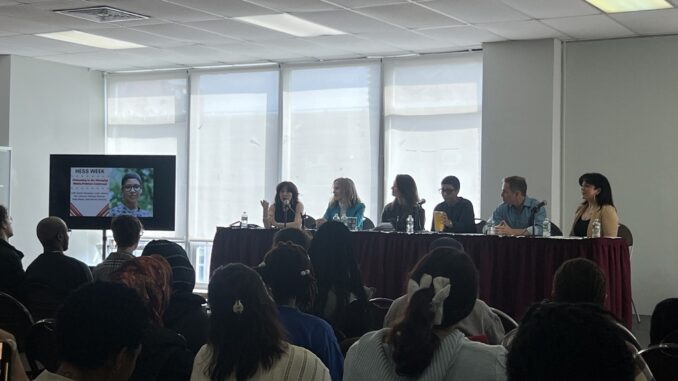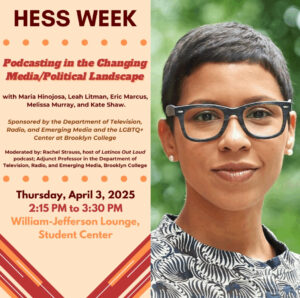
By Jaida Dent

To wrap up Hess Week, the Wolfe Institute presented the final public event: a panel discussion titled “Podcasting in the Changing Media and Political Landscape” on Thursday, April 5. Sponsored by the Television, Radio, and Emerging Media (TREM) department, the talk was moderated by Rachel Strauss, BC adjunct professor for the TREM department and host of the podcast “Latinos Out Loud”. The panelists included Maria Hinojosa, host of “In the Thick”; Eric Marcus, the host of “Making Gay History”; and Leah Litman, Kate Shaw, and Melissa Murray, hosts of “Strict Scrutiny.” Murray was also the 2024-25 Robert L. Hess Scholar-in-Residence, as reported previously by The Vanguard.
“It’s a really exciting time to be a part of this sphere, this space, this urgent medium that’s so wonderful, that’s so different. That’s so engaging […] There’s no other medium that is as engaging as podcasting,” said Strauss.
Hess Week is an annual event at BC where a “distinguished individual representative of an academic discipline at the college” is invited to the campus and honored as the Robert L. Hess Scholar-in-Residence. The current Hess Scholar, Melissa Murray, brought a host of legal knowledge to the BC campus, as the Wolfe Institute’s theme for the year was been “Humanizing the Law”. Murray is the Frederick I. and Grace Stokes Professor of Law at New York University School of Law and previously served as a judicial clerk to Stefan R. Underhill and Sonya Sotomayor during her time in the United States Court of Appeals for the Second Circuit.
The conversation started by addressing how the panelists’ podcasts produce meaningful content. Today, anyone can create a podcast, but for the panelists, their podcasts provide vital information that requires them to lean upon other forms of media. Shaw, Litman, and Murray are all hosts of the legal podcast that discusses the U.S. Supreme Court. They rely on other methods of news gathering, like broadcast news and independent journalists, to do their jobs.
“I think it’s important to talk about the relationship between a podcast and a more traditional media. Because I do think that podcasts are absolutely an increasingly significant part of our media ecosystem. But, for those of us who podcast adjacent to the news in some fashion, we also are somewhat reliant on traditional media,” said Shaw.
While providing important content for listeners, podcasts can also create a connection between the hosts and listeners. As listener, you become part of the conversation and grow an attachment to hosts who are building a community within themselves through the podcast.
“I think one thing that podcasting, you know, offers is like a conversation among friends. The idea is that the listener is kind of like the fourth person at the table, and they get to hear a conversation between people who know each other, right, and kind of like with each other in addition to the justices,” said Litman.
The panelists also discussed the idea of their podcasts providing the truth for listeners. For “Strict Scrutiny”, they wanted to emphasize the race for an open seat on the Wisconsin Supreme Court despite it being after the presidential election, which is a hectic time in politics.
“I think we wanted people to pay attention and know that there was something that they could do to get involved in something where they could have real impact, even if it felt like national politics was, like, overwhelming and scary and all those things are true. So, I think we do make very considerate choices about where to suggest that our listeners focus their time and attention and to do it in places where we do think we can have some impact,” said Shaw.
It was also important to recognize that podcasts can be a mechanism for change. Murray spoke about how her podcast allows her the opportunity to create change in the future of how law is taught by being an educator with a platform like “Strict Scrutiny”.
“I genuinely believe that in 10 or 20 years, people will have a very different model of what it means to be an academic, whether it’s in one of the disciplines or law. And I think some part of that change will have been because we cleared some of that brush by being out in front,” said Murray.
Podcasts have become a form of media that is both informative and intimate. Listeners can digest the media in a way that traditional media doesn’t offer. The impact of this form of media is felt by the creators, listeners, and contributors whose stories get to be told.
“It is gratifying. It always reminds me that what I do has more impact than I sometimes think,” said Marcus. “What I love about podcasts, my podcast in particular, is that I’m able to give a voice to the people I’ve interviewed years ago who thought their stories would never be told. And they get to do it in a podcast in their own voices.”
